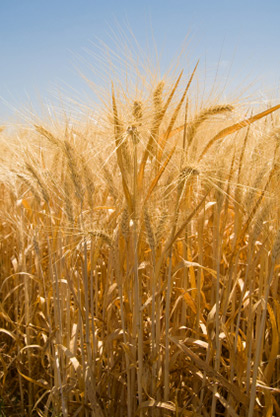How to get by without gluten.
You’ve probably noticed food packages at the grocery store labeled as “gluten-free.” A gluten-free diet seems to be gaining popularity among consumers and celebrities these days as a new fad diet.
So what’s the big deal? What is gluten and why are people trying to avoid it? Does a gluten-free diet have health benefits?
Gluten-Free Diet: Defined
A gluten-free diet is just that: free of gluten. Gluten is a food protein found in grains such as wheat, rye, barley, and triticale (a combination of wheat and rye). Gluten gives dough its elasticity, helps it to rise, and thickens its consistency. It also gives food a chewy texture and enhances its flavor. Many foods have gluten added to them for extra protein.
Found in most breads, pastas, and cereals, gluten is also found in most processed foods. Additionally, it is often added to broths, soups, salad dressings, and sauces as a thickening agent.
Careful study of ingredient labels is essential for those on a gluten-free diet. Not only must one avoid the obvious ingredients such as wheat and other grains, but ingredients such as hydrolyzed vegetable protein (may contain wheat), malt (made from barley), and other wheat derivatives must also be watched out for. Check your pantry and you’ll realize how difficult it is to find gluten-free packaged foods.
Why Go Gluten-Free?
A gluten-free diet is a treatment for people with celiac disease or for those who are allergic to gluten. Those with celiac disease suffer an immune reaction when they eat gluten. This reaction causes intestinal damage, chronic diarrhea, bloating, fatigue, weight loss, bone pain, and an inability to absorb vital nutrients. If someone with celiac disease continues to consume gluten, the chances of developing gastrointestinal cancer increases drastically.
A gluten-free diet is also important for those with a gluten allergy. Exposure to gluten for these people causes hives, digestive problems, or difficulty breathing.
Besides obvious medical reasons, a gluten-free diet is gaining popularity for its other possible health benefits. A gluten-free diet may lead to weight loss, lowered cholesterol, improved digestive health, and increased energy. And as far as this Red Deer Personal Trainer is concerned, those are all awesome 🙂
Health Benefits Explained
Gluten itself is not the devil though. It does not cause you to gain weight and it is not high in cholesterol. However, many people might be sensitive to it and on top of that many of the processed foods containing gluten do just those things. When you cut gluten out of your diet, you eliminate practically all of the unhealthy, processed foods that often contain unhealthy oils, simple carbs, and fat.
A gluten-free diet consists of many organic products, fruits, and vegetables, all of which are high in antioxidants, vitamins, and minerals. These nutrients promote health and wellness.
Keep in mind that despite its possible health benefits, a gluten-free diet isn’t the healthiest diet out there. If you don’t choose your foods well, gluten-free products can be just as unhealthy as their gluten-filled alternative. In addition, by eliminating certain grain product from your diet, you may be eliminating vital nutrients as well, so make sure you take a multi-vitamin.
What to Eat, What Not to Eat
Naturally gluten-free foods include beans, nuts, seeds, eggs, meats, poultry, fish, most dairy products, fruits, and vegetables. These foods must be unprocessed and free from any preservatives or additives.
While certain grains come with gluten naturally, there are grains that are naturally free of gluten. These include buckwheat; flax; gluten-free flours made from soy, rice, or potato; millet; quinoa; and sorghum.
Unless the package says “gluten-free,” those on a gluten-free diet must avoid foods such as beer, cakes, breads, cereals, crackers, French fries, imitation meat, lunchmeat, gravy, sauces, salad dressings, chips, cookies, and soups. Also, be aware that certain medications, vitamins, and Play-Doh may also contain gluten.
It Won’t Be Easy
Initially, going gluten-free may be difficult and frustrating. If you’re a pasta or bread lover you will have to find alternatives. Thankfully, there are an increasing number of food substitutes processed in gluten-free facilities. And while it may take a little more effort to plan meals or eat out, it is possible to do both-even when avoiding gluten.
If you are looking into starting a new weight loss plan and are thinking about trying a Gluten Free diet, chat with your Red Deer Personal Trainer at 360 Fitness to get the 411 on all the info you need!



